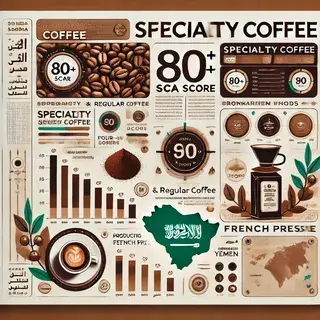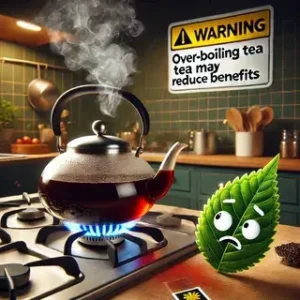In Saudi Arabia, where coffee culture is becoming more and more valued by the populace, specialty coffee is attracting the attention of many coffee lovers and casual observers. However, what is’specialty’ coffee exactly? Above all, specialty is more than just a designation; it is a commitment to excellence, sustainability, and a genuinely remarkable taste experience.
Strict standards are used to evaluate specialty coffee, which receives scores of 80 or higher on the Speciality Coffee Association’s (SCA) cupping scale. Allow me to lead you through this intriguing world and show you how specialty coffee elevates your coffee experiences.
1. What is Specialty Coffee?
Specialty coffee is a grade of coffee that meets specific criteria from cultivation to brewing.
- Handpicked Excellence: Only ripe coffee cherries make it through because they are hand-selected.
- Quality Assurance: Beans must have less than five flaws per 12-ounce serving in order to be considered high-quality.
- Flavor Profile: Speciality coffee has distinct flavors, such as fruity, flowery, or nutty.
In Saudi Arabia, In line with the nation’s love of fine food and drink, demand for premium coffee that is sourced responsibly has surged.
2. The Journey of Specialty Coffee
Understanding how specialty coffee is made enhances your appreciation.
Cultivation
High-altitude cultivation of specialty coffee produces slower growth and richer flavors due to cooler temperatures. Yemen, Colombia, Ethiopia, and other nations are well known for growing specialty-grade beans.
Processing
The beans undergo meticulous processing methods, such as:
- Washed (Wet) Process: creates flavors that are clear and lively.
- Natural (Dry) Process: Fruity, complex characteristics are produced by the natural (dry) process.
- Honey Process: The honey process strikes a balance between acidity and sweetness.
Roasting
Expert roasters highlight the bean’s intrinsic flavors rather than masking imperfections, ensuring a perfect balance of aroma and taste.
3. Why Choose Specialty Coffee?
For those who savor the finest experiences, specialty coffee is a treasure.
- Unmatched Flavour: With undertones of chocolate, jasmine, and berries, each cup tells a tale.
- Ethical Impact: Selecting specialty coffee helps promote fair trade and sustainable growing methods.
- Better Choice: Speciality coffee is devoid of additives and defects in mass-market manufacture.
As someone who loves coffee, I’ve found that specialty coffee not only tastes better but also feels better to drink.
4. Specialty Coffee vs. Commercial Coffee
Here’s how specialty coffee stands apart:
| Aspect | Specialty Coffee | Commercial Coffee |
|---|---|---|
| Source | Single-origin, traceable farms | Mixed and frequently untraceable |
| Harvesting | Selected by hand for excellence | Machine-harvested in bulk |
| Taste | Unique and rich flavor profiles | Common and frequently bitter |
| Processing | Sustainable and moral practices | Focused on volume over quality |
5. Brewing Specialty Coffee at Home
You don’t need to visit a café to enjoy specialty coffee. Here’s how you can brew your perfect cup:
Tools Needed:
- Grinder: A burr grinder ensures even grounds.
- Scale: Precision in measurement is key.
- Brewer: French press, pour-over, or espresso machine.
Steps:
- Grind Fresh Beans: Use whole beans and grind them just before brewing.
- Measure Water and Coffee: The golden ratio is 1:16 (coffee to water).
- Control Water Temperature: Keep it between 90-96°C for optimal extraction.
- Bloom the Coffee: Let the grounds saturate for 30 seconds before full brewing.
- Brew Slowly: Ensure a steady pour for even extraction.
6. Specialty Coffee Trends in Saudi Arabia
The specialty coffee movement in Saudi Arabia is thriving, driven by:
- Third-Wave Coffee Shops: Local cafés focusing on artisanal brewing methods.
- Cold Brew and Nitro Coffee: Perfect for hot climates, these are refreshing and flavorful.
- Coffee Festivals: Events like the Saudi Coffee Festival celebrate the country’s rich coffee heritage.
7. Specialty Coffee and Saudi Arabia’s Tradition
Saudi Arabia has a rich coffee culture deeply rooted in hospitality and tradition. Although Gahwa, or traditional Arabic coffee, is still a mainstay, specialty coffee is becoming more and more well-liked due to its superior quality and distinctive flavors. A distinctive fusion of innovation and tradition is produced when the two cultures are combined.
8. Frequently Asked Questions
What is the difference between single-origin and blends?
Single-origin coffee comes from one region or farm, offering distinct flavors, while blends combine beans from various sources for consistency.
How does altitude affect coffee flavor?
Higher altitudes lead to denser beans, which develop complex and nuanced flavors.
Is specialty coffee worth the price?
Absolutely! You’re paying for exceptional quality, ethical sourcing, and an unparalleled flavor journey.
Conclusion
Specialty coffee isn’t just a beverage; it’s an experience. Whether you’re enjoying a cup at home or visiting one of Saudi Arabia’s specialty cafés, you’ll find yourself immersed in its world of flavor, culture, and sustainability. I encourage you to explore this journey—trust me, your taste buds will thank you!
By embracing specialty coffee, you’re not just indulging in an exceptional drink; you’re supporting a global movement toward quality, ethics, and sustainability.
1. What Makes Coffee a Specialty Coffee?
Specialty coffee is distinguished by its premium beans and painstaking manufacturing method. For the beans to be considered “specialty,” they need to score 80 or higher on the Speciality Coffee Association (SCA) standard.
- Selection: Only the tastiest cherries are processed thanks to hand-picked beans.
- Defect-Free: Each 12-ounce sample of beans must include no more than five flaws.
- Taste Profile: They have distinct flavors like nutty, fruity, or flowery undertones.
2. How is Specialty Coffee Different from Regular Coffee?
Specialty coffee differs in various aspects, such as:
- Quality: Speciality beans are carefully processed after being cultivated in ideal climates.
- Flavor: Speciality coffee has distinct flavor notes that set it apart from commercial coffee.
- Sustainability: Eco-friendly methods are frequently used to raise specialty coffee.
3. What is the Origin of Specialty Coffee?
Specialty coffee was first talked about in the 1970s when Erna Knutsen employed the word to define specific coffee beans that have distinct flavors. Those beans were grown in specific micro-climates, making sure that the quality of the beans was still better. Now Ethiopia, Colombia, and Yemen among other countries head in producing specialty coffees.
4. Why is Specialty Coffee More Expensive?
Several factors contribute to the higher cost of specialty coffee:
- Harvesting by Hand: Harvesting ripe cherries by hand takes more time and effort.
- Quality Control: Extensive testing and grading are applied to specialty coffee.
- Sustainable Practices: A lot of specialty coffee plantations follow moral and environmentally responsible guidelines.
5. Is Specialty Coffee Healthier Than Regular Coffee?
Yes, specialty coffee is often considered healthier because:
- Because of the rigorous quality tests, it has fewer toxins.
- Because of careful roasting, it maintains more of its natural antioxidants.
- It doesn’t contain any additives that are frequently present in commercial coffee blends.
6. What Are the Best Brewing Methods for Specialty Coffee?
To enjoy the full flavors of specialty coffee, use these brewing methods:
- Pour-Over: Brings out subtle flavors.
- French Press: A rich and robust cup is produced by the French press.
- AeroPress: Offers excellent flavor extraction along with convenience.
- Espresso Maker: Perfect for a strong, fragrant brew.
7. What Are the Benefits of Drinking Specialty Coffee?
Drinking specialty coffee offers:
- Enhanced Taste: Unique and complex flavors elevate the coffee experience.
- Support for Farmers: Ethical sourcing benefits small-scale farmers.
- Sustainability: Promotes eco-friendly farming practices.
8. How Do I Know If My Coffee is Specialty-Grade?
To identify specialty-grade coffee:
- Look for the SCA score or certification.
- Check for single-origin labeling.
- Assess the flavor—specialty coffee is never overly bitter or flat.
9. What is the Role of the SCA in Specialty Coffee?
The Speciality Coffee Association (SCA) establishes guidelines for sustainability, education, and quality assurance. They are also in charge of defining specialty coffee through a rating system.
10. Where Can I Buy Specialty Coffee in Saudi Arabia?
These days, Saudi Arabia is a country with a few specialty coffee shops and roasters. They boast of coffee shops that use expert brewing techniques, ecologically conscious sourcing, and single-origin beans. Most of these stores also offer home delivery.
11. What Are the Most Popular Specialty Coffee Flavors?
Specialty coffee is known for its unique tasting notes, including:
- Fruity: citrus, blueberries, or strawberries.
- Floral: Camomile, lavender, or jasmine are examples of flowers.
- Nut-like: walnut, hazelnut, or almond.
- Sweet: honey, caramel, or chocolate.
12. What is Single-Origin Coffee, and Why is it Important?
Single-origin coffee comes from a specific region or farm, highlighting its unique flavor profile. It offers a purer taste experience compared to blends, making it a favorite among connoisseurs.
13. How Does Altitude Affect Specialty Coffee Quality?
Beans at higher elevations mature more slowly, producing denser beans with more nuanced flavors. Because of its rich acidity and complex flavor, specialty coffee cultivated over 1,200 meters is frequently valued.
14. What is the Difference Between Washed and Natural Coffee?
- Washed (Wet) Process: Produces a clean and bright flavor.
- Natural (Dry) Process: Offers fruity and bold notes.
15. Can I Brew Specialty Coffee Using a French Press?
Absolutely! Because it retains the natural oils, the French press produces a cup of specialty coffee that is delicious and full-bodied.
16. Which Countries Produce the Best Specialty Coffee?
The leading specialty coffee producers include:
- Ethiopia: Known for floral and fruity flavors.
- Colombia: Famous for balanced and nutty profiles.
- Yemen: Celebrated for its rich, wine-like notes.
17. What Certifications Should I Look for in Specialty Coffee?
- Fair Trade: Ensures ethical treatment of farmers.
- Organic: Guarantees environmentally friendly farming.
- Rainforest Alliance: Promotes biodiversity conservation.
18. How Does Specialty Coffee Support Sustainable Farming?
Specialty coffee producers often use:
- Eco-friendly growing techniques.
- Renewable energy during processing.
- Programs to improve community welfare.
19. What is the Difference Between Micro-Lot and Specialty Coffee?
- Micro-Lot Coffee: Produced in limited quantities, offering exclusive flavors.
- Specialty Coffee: High-quality coffee with rigorous grading.
20. How Can I Store Specialty Coffee to Maintain Freshness?
- Make use of a sealed container.
- Keep in a dark, cool area.
- To stop beans from absorbing moisture, don’t put them in the refrigerator.




